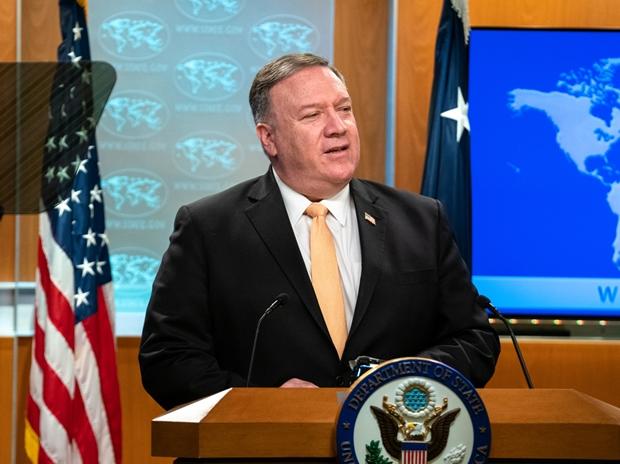WASHINGTON : US Secretary of State Michael Pompeo has left for India for the third edition of the 2+2 ministerial dialogue to be held in New Delhi on Tuesday during which the two sides are expected to explore ways to further bolster bilateral defence ties and security cooperation in the Indo-Pacific, amidst China flexing its muscles in the strategic region.
The visit comes a week before the US presidential election on November 3.
“Wheels up for my trip to India, Sri Lanka, Maldives, and Indonesia. Grateful for the opportunity to connect with our partners to promote a shared vision for a free and open #IndoPacific composed of independent, strong, and prosperous nations,” Pompeo tweeted on Sunday.
Pompeo will be accompanied by Secretary of Defense Mark Esper. The Indian side at the talks will be represented by External Affairs Minister S Jaishankar and Defence Minister Rajnath Singh.
The high-level talks are taking place in the midst of India’s festering border row with China in eastern Ladakh as well as the renewed global focus on the growing Chinese military assertiveness in the Indo-Pacific region. Both issues are expected to figure in the talks.
India, the US and several other world powers have been talking about the need to ensure a free, open, and thriving Indo-Pacific in the backdrop of China’s rising military maneuvering in the region.
In November 2017, India, Japan, the US and Australia gave shape to the long-pending proposal of setting up the “Quad” to develop a new strategy to keep the critical sea routes in the Indo-Pacific free of any influence.
In the midst of growing global concern over China’s expansionist behaviour, the foreign ministers of the Quad member nations met in Tokyo on October 6 and reaffirmed their collective vision for a free, open and inclusive Indo-Pacific.
The evolving situation in the Indo-Pacific region in the wake of China’s increasing military muscle-flexing has become a major talking point among leading global powers. The US has been favouring making Quad a security architecture to check China’s growing assertiveness.
Ahead of the meeting, the US State Department said America welcomes India’s emergence as a leading regional and global power.
It also said the US was looking forward to working closely with India during the latter’s upcoming UN Security Council term, starting January 1, 2021.
“The United States welcomes India’s emergence as a leading regional and global power. The United States looks forward to collaborating closely with India during its upcoming term on the UN Security Council,” the State Department said.
In a fact sheet, the State Department said the two countries have a strong and growing bilateral relationship built on shared values and a commitment to a free and open Indo-Pacific.
As the world’s oldest and largest democracies, the US and India enjoy deeply rooted democratic traditions, it added.
“The growth in the partnership reflects a deepening strategic convergence on a range of issues. Our cooperation is expanding in important areas including health, infrastructure development, energy, aviation, science, and space,” it said, adding that holding the third US-India 2+2 Ministerial Dialogue in just over two years demonstrates a high-level commitment to their shared diplomatic and security objectives. Pompeo’s visit marks the fourth visit to India by a Secretary of State during the Trump administration.
According to the State Department, the recent Quadrilateral Ministerial meeting in Tokyo convened by Pompeo and his counterparts demonstrated the strong cooperative ties among Indo-Pacific democracies interested in strengthening a rules-based order in which all nations are sovereign, strong, and prosperous.
“The Quad has proven to be an effective multilateral mechanism, helping to create resilient supply chains, promote transparency, counter disinformation and increase maritime security,” it said.
India, with its large economy, strong support for entrepreneurship and innovation, and its growing international trade, is one of the world’s leading economic powers and is well-positioned to promote our shared vision for a free and rules-based Indo-Pacific where all nations can prosper, it said.
Observing that India and the US are expanding cooperation between the two militaries, the fact sheet said this includes the navies, which play a critical role in ensuring freedom of navigation in the Indo-Pacific.
Noting that defence trade has increased significantly over the past two decades, the State Department said India maintains the largest fleets of C-17 and P-8 aircraft outside the United States and as of 2020, the United States has authorised more than USD 20 billion in defence sales to India.
“The United States and India enjoy robust defence industrial cooperation. Through the US- India Defense Technology and Trade Initiative, the United States and India work together on co-production and co-development of defence equipment,” it said.
The first edition of the 2+2 dialogue was held in Delhi in September 2018 after the mechanism was approved by Prime Minister Narendra Modi and President Donald Trump. The second edition of the dialogue took place in Washington in December last year. (AGENCIES)
Trending Now
E-Paper


